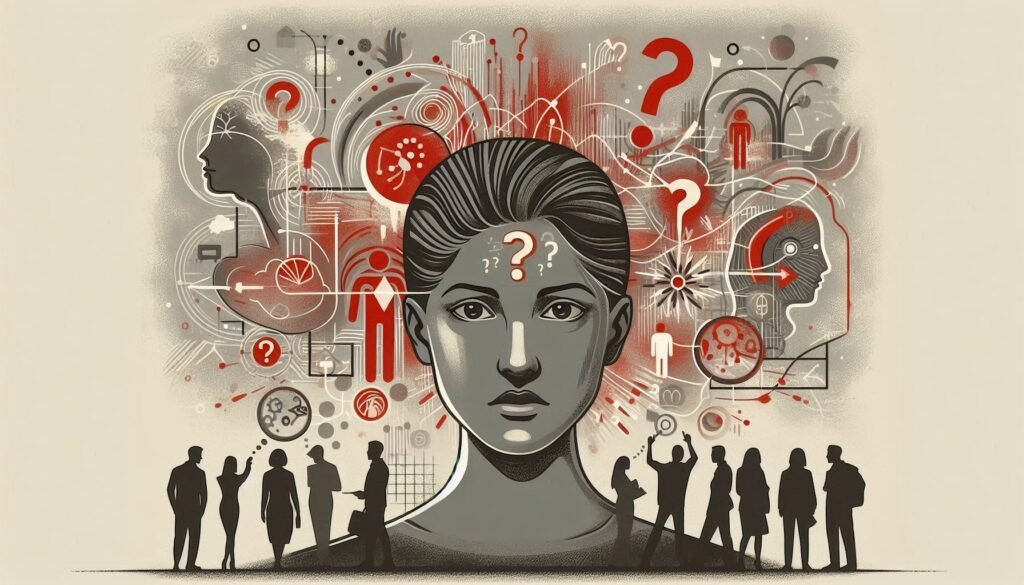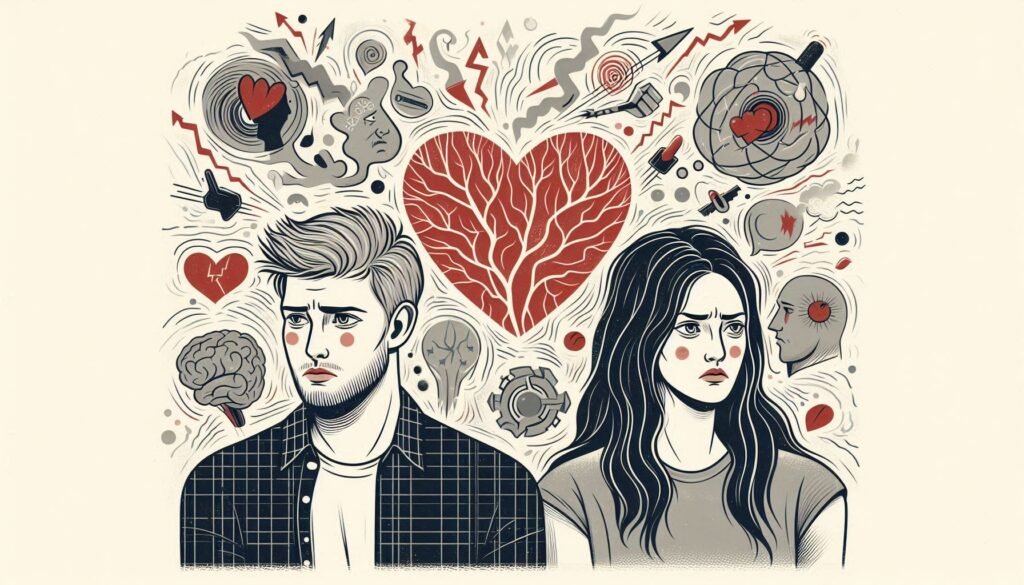Neuroticism—a term often thrown around in casual conversations—carries more weight than many realize. This psychological trait, characterized by emotional instability and heightened sensitivity to stress, influences how we perceive the world and those around us. As individuals high in neuroticism navigate social landscapes, their interpretations can become tinted with biases that skew reality.
But what exactly happens when neuroticism meets social perception? The interplay is complex and multifaceted, affecting everything from our thoughts on others’ intentions to our own self-image. With a keen understanding of this relationship, we can uncover valuable insights into human behavior and improve our interactions.
In this blog post, we’ll explore the intricate dynamics between neuroticism and social perception biases. By delving deeper into these connections, we aim to illuminate how they shape not only personal relationships but also broader societal views. Join us as we unravel the complexities behind this fascinating topic!

Understanding Neuroticism: A Psychological Trait Overview
Neuroticism is one of the five major personality traits in psychology, often linked to emotional instability. Individuals scoring high on neuroticism tend to experience anxiety, mood swings, and irritability more frequently than their low-scoring counterparts. This emotional variability can significantly influence behavior and decision-making.
People with high neuroticism are usually more sensitive to stressors and challenges. They may perceive neutral situations as threatening or overwhelming, leading to heightened levels of worry and fear. These reactions can cloud judgment, impacting personal relationships and social interactions.
Research indicates that neurotic individuals might struggle with self-esteem issues as well. Their tendency to ruminate on negative experiences can exacerbate feelings of inadequacy or vulnerability in social settings. This ongoing cycle reinforces their perceptions about themselves and others.
Understanding neuroticism helps us appreciate how this trait shapes our interactions with the world around us. It’s not just a label; it provides insight into behaviors that may seem perplexing at first glance.
The Mechanism of Social Perception: How We Interpret Others
Social perception is the process through which we interpret and understand the behaviors, emotions, and intentions of others. This complex mechanism plays a vital role in shaping our interactions and forming relationships. We rely on nonverbal cues like facial expressions, body language, and tone of voice to gather information about how someone might be feeling.
Our past experiences also influence how we perceive people. When we meet someone new, our brain subconsciously references previous encounters to make sense of their actions. This can lead to biases based on stereotypes or personal history.
Additionally, context matters significantly in social perception. The environment where an interaction occurs can color our interpretations—what may seem rude in one setting could be perceived as normal behavior in another.
Cognitive shortcuts known as heuristics help us navigate these perceptions quickly but can also lead us astray. While they save time during social evaluations, these mental shortcuts often overlook nuances essential for accurate understanding.
Neuroticism’s Impact on Social Information Processing
Neuroticism significantly influences how individuals process social information. Those high in neurotic traits often exhibit heightened sensitivity to emotional cues. This can lead them to perceive negative signals more acutely than their less neurotic counterparts, skewing their interpretation of social interactions.
This trait alters attention mechanisms, causing neurotic individuals to focus on potential threats or negative behaviors. As a result, they may misinterpret neutral actions as hostile or dismissive. Such distortions disrupt healthy communication and create misunderstanding in relationships.
Additionally, the tendency for rumination prevalent in neuroticism means that these individuals frequently revisit past interactions with an overly critical lens. This ongoing evaluation reinforces biased perceptions and can exacerbate feelings of anxiety about future encounters.
Moreover, neuroticism affects memory recall related to social events. Individuals might remember negative experiences more vividly than positive ones, further perpetuating cycles of negativity in their perception of others and the world around them.
The Negativity Bias: How Neuroticism Amplifies Negative Perceptions
Negativity bias is a cognitive phenomenon where individuals give more weight to negative experiences than positive ones. This tendency can be particularly pronounced in those with higher levels of neuroticism. Neurotic individuals often perceive social cues through a lens of anxiety and worry, amplifying their focus on potential threats or negative outcomes.
As they navigate social interactions, neurotic people may misinterpret neutral or ambiguous behaviors as hostile or dismissive. For instance, if someone appears distracted during a conversation, the neurotic individual might assume that they are uninterested or disapproving. Such interpretations can lead to unnecessary conflict and misunderstanding.
Furthermore, this heightened sensitivity can create a feedback loop. When faced with perceived negativity from others, those high in neuroticism often withdraw or react defensively. This behavior reinforces their initial perceptions and exacerbates feelings of isolation.
This negativity bias distorts relationships and hinders effective communication. The challenge lies in recognizing these patterns before they shape one’s view of themselves and others irreparably.
Neuroticism and Attributional Biases in Social Interactions
Neuroticism significantly influences how individuals interpret and make sense of social interactions. Those high in neuroticism tend to exhibit attributional biases, which affect their perceptions of others’ behaviors. They often attribute negative actions to internal traits rather than external factors, leading to misunderstandings.
For instance, if a friend cancels plans, a person with high neuroticism might think it reflects personal rejection instead of considering situational circumstances. This inclination can distort relationships and create unnecessary tension between individuals.
Moreover, neurotic individuals may also downplay positive experiences or gestures from others. When receiving compliments or support, they might dismiss these as insincere or view them through a lens of skepticism. This selective perception reinforces feelings of inadequacy and anxiety.
Consequently, the interplay between neuroticism and attributional biases shapes social dynamics profoundly. Understanding this relationship is crucial for fostering healthier interactions and improving emotional well-being among those affected by heightened levels of neuroticism.
The Role of Anxiety in Shaping Social Perceptions
Anxiety plays a significant role in shaping how we perceive social interactions. Individuals with heightened anxiety often view situations through a distorted lens, leading them to misinterpret the intentions of others. This skewed perception can result in misunderstandings and conflict, further complicating social dynamics.
When anxious individuals enter social settings, they may focus excessively on negative cues. This hyper-awareness can cause them to overlook positive signals that indicate friendliness or openness. Consequently, their interpretations may lean heavily toward pessimism.
Moreover, anxiety influences the way people respond to feedback from others. Anxious individuals might interpret neutral comments as disapproval or criticism, fostering feelings of inadequacy and reinforcing their fears about social rejection.
This cycle perpetuates itself: the more one feels misunderstood or judged due to anxiety-driven biases, the less likely they are to engage positively with others. Such patterns not only impact individual well-being but also strain relationships within various social contexts.
Neuroticism and Self-Fulfilling Prophecies in Social Relationships
Neuroticism can lead to self-fulfilling prophecies in social relationships. Individuals high in neuroticism often harbor doubts about their worth and the intentions of others. These fears can distort their perceptions, causing them to interpret benign actions as negative or threatening.
When a highly neurotic person anticipates rejection, they may act defensively or withdraw socially. This behavior can inadvertently push others away, reinforcing their original belief that they are unlovable or unwanted. Such patterns create a cycle where anxiety perpetuates isolation.
Moreover, these individuals might project their insecurities onto friends and partners. If someone with high neuroticism believes another person is upset with them, they may pull back emotionally. This withdrawal can cause misunderstandings and conflicts that never would have arisen without those initial worries.
These dynamics illustrate how neurotic tendencies shape interactions profoundly. As individuals navigate social landscapes through this lens of anxiety, it becomes essential to recognize and address these biases for healthier relationships.
Strategies for Mitigating Neuroticism-Induced Perception Biases
Mitigating neuroticism-induced perception biases requires a multi-faceted approach. One effective strategy is cognitive restructuring, which involves identifying and challenging negative thought patterns. By reframing their thoughts, individuals can create more balanced perspectives of social situations.
Mindfulness practices also play a crucial role in reducing anxiety and enhancing emotional regulation. Techniques such as meditation and deep breathing can help ground individuals in the present moment, allowing them to respond rather than react to perceived social threats.
Engaging in social skills training can further aid those affected by neuroticism. This training fosters better communication abilities and enhances confidence during interactions. Improved skills often lead to more positive interpretations of others’ behaviors.
Seeking support from mental health professionals can provide valuable tools for managing neurotic traits. Therapy options like Cognitive Behavioral Therapy (CBT) specifically target the biases that arise from neuroticism, empowering individuals to reshape their perceptions over time.
The Impact of Neuroticism on Social Support Perception
Neuroticism significantly influences how individuals perceive social support. Those high in neurotic traits often interpret the intentions and actions of others through a lens of skepticism. This can lead to doubts about the sincerity or availability of support from friends and family.
People with higher levels of neuroticism may experience heightened sensitivity to perceived slights or emotional distance, even when none are intended. This misinterpretation can result in feelings of isolation during challenging times, as they might withdraw further instead of seeking help.
Moreover, their anxiety may distort positive interactions, making them feel more critical and less trusting. As a result, they may overlook genuine offers of assistance or reassurance that could alleviate their distress.
This negative framing not only affects personal relationships but also hampers overall well-being. When individuals fail to recognize available support networks due to bias induced by neuroticism, it perpetuates a cycle of loneliness and anxiety that is hard to break free from.
Future Directions: Research and Interventions for Neuroticism and Social Perception
The relationship between neuroticism and social perception biases invites further exploration in both research and practical interventions. Studies are increasingly focusing on how these traits can influence interpersonal dynamics, leading to misunderstandings or conflicts. This area of psychology holds potential for developing targeted therapeutic approaches.
Researchers are looking into cognitive-behavioral techniques that can help individuals with high levels of neuroticism recognize and adjust their biased perceptions. Interventions might include mindfulness practices aimed at reducing anxiety, thus improving emotional regulation during social interactions.
Moreover, understanding the neural mechanisms underlying these biases could lead to innovative treatment strategies. Techniques such as neurofeedback or virtual reality exposure therapy may hold promise for reshaping maladaptive thought patterns rooted in neuroticism.
Collaborative efforts among psychologists, neuroscientists, and educators will be essential to create supportive environments that facilitate healthy social perceptions. As we deepen our knowledge about this interplay, we pave the way for enhancing mental well-being through improved relationships and community support systems focused on mitigating the effects of neuroticism on social perception biases.


